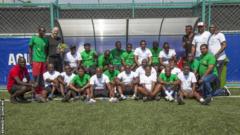In 2012 former Zambia international Nchimunya Mweetwa's promising football career came to an abrupt end when he was convicted and banned for match-fixing.
The 34-year-old is now using his own personal experiences to try and help others to avoid a similar fate through the Nchimunya Mweetwa Sports Foundation.
As a youngster he rose through high school football onto club stardom before clinching a dream move abroad.
His move to RoPS in Finland also saw him being called up to the Zambian national team.
The dream came crashing down when he, with five other Zambian players, was arrested, tried and convicted of match fixing.
He spent nine days in police cells before his trial and was handed a suspended eight month sentence after an appeal. His conviction led to a two-year ban by football's world governing body, Fifa.
After his ban he returned to play in Zambia, Uganda and Botswana but now devotes his time to his foundation.
The fall from grace
He says falling into the match fixing trap did not happen overnight and believes his youthful naivety and over-trusting nature were key to his fall from grace.
"Wilson Raj Perumal is the match fixer who approached me. He was eventually arrested in Finland trying to fix matches," he explained.
"He had papers showing that he was a licensed Fifa agent. I do not know if he forged those papers but he had a licence showing that he was a Fifa agent."
"He approached my friends and started giving them money under the guise of being an agent.
"He spent about one or two years flashing money and saying 'I like the way you play,' without you realising he was a match fixer wanting you to work for him in return.
"I was also approached, he gave me about 10,000 Euros and gave me more over time saying he was happy with the way I was playing because I was a big name in my town where I was playing. Everyone talked about the way I played."
The cash gifts continued flowing until Perumal eventually had garnered enough leverage to recruit Mweetwa to his match fixing army.
"I was getting the money and enjoying it, partying but eventually reality dawned on me. He said the money was not for free. You need to start doing this, the money was good so I never thought it was bad to start fixing the games," he said.
It was not until he was arrested that the reality dawned on Mweetwa that his luck had run out.
"The sad part is I was caught (arrested) on the field of play. We were training at the gym in the morning and then from the gym we went on the field of play and the police came. They had to close all the exit doors and they picked me up," he says.
"I didn't even go home to see my wife and say I'm going to jail. They first went to raid my apartment and they got every device that was there and my wife did not know what was happening.
"They took me to a jail cell with the policemen telling me to take off my shoes and belt. I stayed in the cell for nine days. I went to court after four days. After four days they transferred me to another town in a solitary room. It was mental torture and it was depressing."
Helping others

Mweetwa is now determined to help stop other young players falling into the same trap that he found himself caught up in.
"We will tour the country (Zambia) and we are trying to get the athletes from the grassroots level to be of good character," he explained.
"We want to integrate skill and talent with integrity into athletes so that when they become successful their good character will sustain them."
Mweetwa admits that telling his story is not easy and knows some people will judge him in a bad light but he wants others to learn from it and avoid being trapped in vices like match fixing.
"It is not a good story but on the other hand it's important your son hears you say that you cheated but that you do not want to hear another person cheat," he added.
"Today they see me as their hero because I tell them that I do not want you to fall prey to unsportsmanlike behaviour.
"I am not the only one but I am the only one who has come out and I can even tell you that one of my friends - after hearing me - has said 'I also want to speak out', added Mweetwa.
He says that although African players fall prey to match fixing partly as a result of a poor economic background it should never be used as an excuse.
"Africa is a poverty stricken continent, we are not privileged enough like these other continents like Europe and America but we cannot just say because of poverty that is why we behave unethically," he insists.
"We cannot say because of poverty that is why I am stealing. For me and the rest of the group what we are trying to do is to reduce the number of athletes falling prey.
"It is difficult and it is very hard because everyone wants to have food on the table and if you are offered money to dishonestly manipulate a game you are tempted.
"We are trying to help these people to actually think about the long term and not the short term of receiving money - just to use it there and then and then lose everything.
"We are trying to make people understand that you can actually live with a true conscience and make it in life."
Source: BBC
